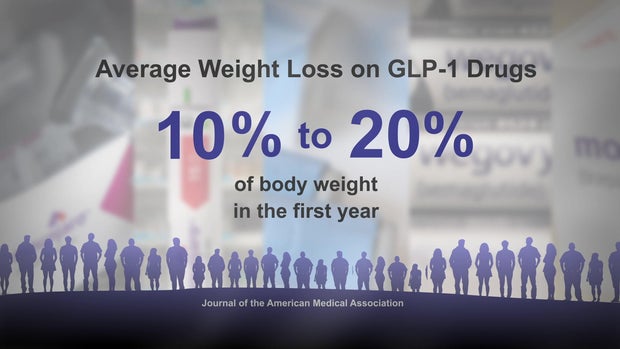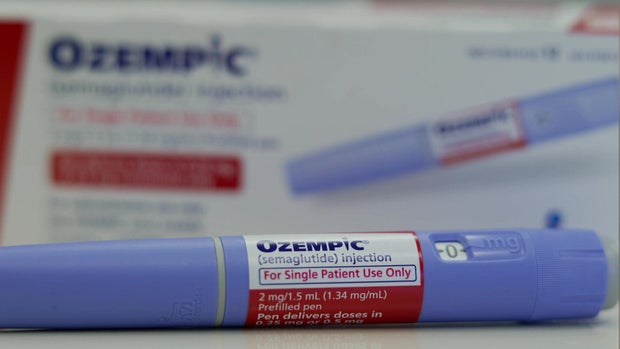▶ Watch Video: How Ozempic, other weight-loss drugs are “changing medicine”
Forty-four-year-old LaQuita Clark says memories of being overweight – and ridiculed – go back to middle school. “I remember sitting on the school steps with a group of my friends, and just a group of other kids walking by: ‘Oh my God, you’re so fat!’ It was very hurtful.”
Over the years, Clark, a nurse in Nashville, Tennessee, tried everything from fad dieting to kickboxing. Nothing worked. “It was almost like torture, because of that relationship that I had with the food, these are things that I love,” she said. “I’m eating things that I love, and it’s giving me comfort at the moment. So, why change that?”
But last June, everything changed when, diagnosed as prediabetic, Clark was prescribed Ozempic. With one small injection a week, her health improved – and something else happened.
At her heaviest, she said she weighed 250 pounds. “Right now I’m at 164. That’s life-changing.”
Ozempic and Mounjaro (used for diabetes), and Wegovy and Zepbound (approved for weight loss), are GLP-1 drugs. According to Dr. Rekha Kumar, the GLP-1 class of medicines signals fullness to the brain and regulates blood sugar. And those taking the drug will know when to stop eating. “It’s really amazing to see it when it works,” she said. “And people will say that it’s the first time they felt normal, or it’s the first time they felt full.”
Kumar is the chief medical officer at Found, the weight loss app that LaQuita Clark uses to receive her care – and to get her Ozempic.
An obesity specialist, Kumar helped oversee early trials of GLP-1 medications. The results? On average, people lose 10 to 20 percent of their body weight in the first year. For many of the roughly 74 percent of Americans who are overweight or obese, that is almost unimaginable.

“This is a scientific breakthrough,” Kumar said, “not just because of weight control, but because of cardiovascular risk reduction, [and] treating diabetes. People are actually getting healthier, and that’s the point of medicine. It isn’t just to be thinner.”
But clearly being thinner is what’s causing all the buzz. Kumar said, “It’s all over social media. People are documenting their journeys, they’re injecting on Instagram, showing other people how to do it.”
And that concerns her. “We’re seeing people want to get ahold of these medicines that don’t need them at all – people trying to fit into dresses, and wanting to lose the vanity weight,” she said. “And that’s not really what these were made for.”
It’s led to people trying to obtain GLP-1 drugs from some unusual sources: “One of my colleagues forwarded me an email from her hair salon, basically saying, like, ‘Come get a blow dry and get your Ozempic,'” Kumar said.

Drugs like Ozempic are also making an impression on Wall Street. Simeon Siegel, a senior analyst at BMO Capital Markets, says GLP-1 drugs could be a goldmine for investors. He likens the potential impact to that of the iPhone. “If it hits 40% of the people, at the end of the day, if this becomes something that is as widely accessible as conversations [about it suggest], it should have a very large impact,” he said.
With people thinner, he envisions a ripple effect – a potential boom in athleisure wear, even in gym memberships.
But wouldn’t a successful weight-loss drug mean the death knell of gyms? “My hypothesis, with anecdotal evidence, is when someone who hasn’t been fit becomes fit, starts becoming fit, they change their life to make sure they’re protecting and truly being fit,” Siegel said. So, instead of cancelling the gym membership, they would tend to sign up.
He says analysts even blue-sky about a big boost for airlines, since lighter passengers could mean lower costs. But all this depends on the drugs being widely available, which currently is far from a given.
Dr. Kumar says the biggest problem with these medicines right now is access: “There are people paying out of pocket, sometimes up to $1,200 a month. So, right now, 30% of the time we’re seeing coverage of these medicines, which is quite low, considering we said 70% of the population might qualify.”
Beyond cost, there’s the issue of side effects, like an upset stomach, sometimes severe. But the big lingering question about GLP-1s is the lack of knowledge about long-term effects. “I think that’s a concern, that we don’t have a hundred years of data; we have 20 years of data,” Kumar said.
Dr. Mara Gordon, an assistant professor at Cooper Medical School of Rowan University in Camden, N.J., says we don’t know how long someone taking a GLP-1 drug just to lose weight would have to keep taking it. “One of the active research questions that’s going on around this class of medication right now is, what happens when you stop? We think that people tend to regain weight.”
But that is not her main concern. Rather, Gordon, who calls herself a “body-positive doctor,” is worried these drugs feed a serious prejudice in our society: “The problem is fat-phobia. The problem is a culture that discriminates against people based on body size. This is a really serious moral issue that our culture is facing. And Ozempic is absolutely part of that.”
She says she doesn’t bring up her patients’ weight unless they want to. But she has no qualms about prescribing Ozempic, or a similar drug, in cases where their health is at stake. “In patients who have diabetes, medications like Ozempic can really help them,” she said. “It can help improve their blood sugar. It can help protect their heart.”
And though she is quite happy with what her body looks like now, LaQuita Clark says feeling better on the inside is the most important part. If that involves taking medication, so be it. “I think society is stuck on what your body looks like, not so much concerned about the insides, or your health,” she said. “My focus and my goal is being healthy and being around for some years to see my children and my grandchildren grow up. So, I don’t care about what society thinks, or what people are saying about it.”
For more info:
- Ozempic
- Mounjaro
- Wegovy
- Zepbound
- Weight loss app Found
- Mara Gordon, MD, assistant professor of family medicine, Cooper Medical School of Rowan University, Camden, N.J.
- Simeon Siegel, retail & services analyst, BMO Capital Markets
Story produced by Amiel Weisfogel. Editor: Remington Korper.







